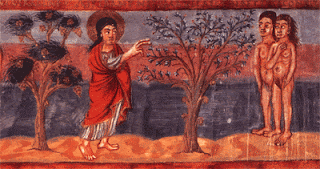Apocryphote of the Day: 10-3-08
/Gospel of Philip 65.36-66.7 (late second century Valentinian text; Syrian or Alexandrian?)
 When Eve was still in Adam, death did not exist. When she was separated from him, death came into being. If he enters again and attains his former self, there will be no death...Christ came to repair the separation which was from the beginning and again unite the two, and to give life to those who died as a result of the separation and unite them. The woman is united to her husband in the bridal chamber. Indeed those who have united in the bridal chamber will no longer be separated.
When Eve was still in Adam, death did not exist. When she was separated from him, death came into being. If he enters again and attains his former self, there will be no death...Christ came to repair the separation which was from the beginning and again unite the two, and to give life to those who died as a result of the separation and unite them. The woman is united to her husband in the bridal chamber. Indeed those who have united in the bridal chamber will no longer be separated.Isla Carroll and Percy E. Turner Professor of New Testament and Early Christianity since 2006
Chair of the Department of Religion at Rice University 2013-2019
Figure Foundation Book Award for The Gnostic New Age: How a Countercultural Spirituality Revolutionized Religion From Antiquity to Today (New York: Columbia University Press 2016)
Grant Recipient with James McGrath and Charles Häberl, National Endowment for the Humanities, The Mandaean Book of John: Critical Edition, Translation, and Commentary, 2012-14
Co-Founder and Executive Editor of GNOSIS: Journal of Gnostic Studies (Leiden: Brill) since 2015
Editorial Board of Journal of the American Academy of Religion (Oxford: Oxford University Press) since 2019
Editorial Board for Nag Hammadi and Manichaean Studies (Leiden: Brill) since 2008
Grant recipient and Faculty Leader of Andrew W. Mellon Graduate Research Seminar, Emerging Religions 2017-2019
Chair, Society of Biblical Literature, Committee for the Status of Women in the Profession, 2016-2018
Research Fellow in the Boniuk Institute for the Study and Advancement of Religious 2014-2015
Associate Editor for Macmillan Interdisciplinary Handbooks on Religion, ten-volumes, 2016
Faculty in the Center for the Study of Women, Gender and Sexuality, Rice University, since 2006
Grant recipient and Faculty Leader of Andrew W. Mellon Graduate Research Seminar, Mapping Death, 2010-2012
Associate Editor for Vigiliae Christianae, Journal and Monograph series (Leiden: Brill) 2014-2015
Co-chair of Nag Hammadi and Gnosticism Section, Society of Biblical Literature, 2012-2018
Founding Chair and Member of Steering Committee of Mysticism, Esotericism and Gnosticism in Antiquity Section, Society of Biblical Literature since 1996
Member of Committee on the Status of Women in the Profession, Society of Biblical Literature, 2012-2018
Founder of the Cognition and Culture in the Humanities Workshop, Rice University, 2011-2013
29th Annual Loy Witherspoon Lecturer, University of North Carolina 2013
Centennial Lecturer for Rackham School of Graduate Studies, University of Michigan 2012
Edgar and Dorothy Davidson Annual Lecturer, Carleton University 2009
Member of Phi Kappa Phi Honors Society since 2002
Member of Phi Beta Kappa Honors Society since 1988
Affiliated with the Society of Biblical Literature since 1987
Affiliated with the International Association for Coptic Studies since 2006
Affiliated with the North American Patristics Society since 2006
Affiliated with the American Academy of Religion since 2007
Affiliated with the European Society for the Study of Western Esotericism since 2016
C
Powered by Squarespace